CIA Sponsored Terror, Civil Liberties, Criminalizing Dissent, Cuba, Guantanamo, Habeas Corpus, Human Rights, Military Tribunal, NSA Spying, Political Prisoner, Prison Industry, Prosecution of the Bush Administration, Surveillance, Torture, Uncategorized, War Resister
Podcast: Play in new window | Download
Updates:

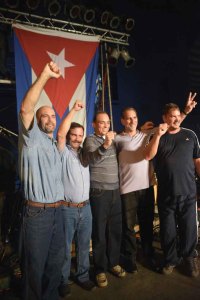
New Cuba-U.S.A. Pact And Remaining Cuban Five Prisoners Released
Attorney Michael Ratner:
- We’ve been covering this case for years on here. They were wrongfully convicted. They had been sent into Miami to stop Miami-Cuban terrorism against Cuba.
- The U.S. in a vindictive prosecution had sentenced them for many years, in fact one of them was sentenced to life in prison for conspiracy to commit espionage I think.
- It’s all part of a larger picture of what’s going on.
- Cuba in what’s not considered an exchange, of course obviously, released Alan Gross.
- Obama within limits sounds like he’s going to open relations within a certain way with Cuba and open an embassy in Cuba and Cuba, one in the United States.
- It’s amazing moment, the revolution took place in 1959, so that’s only 55 years ago approx, the embargo has been in effect since 1961. It’s still in effect of course but this is a really major moment.
- Attorney Len Weinglass would take 1 or 2 cases at a time, work on them like a dog, whether it was Mumia or in this case the Cuban Five and put every piece, every part of his life into it.
——
Attorney Heidi Boghosian:
- In the U.S. we continue to see the news portraying the five as spies when like you said they were really here to uncover unlawful activities on the part of the U.S government.
- They handed over files to the FBI, they were very forthright with the information they gathered.
- We also know from our interviews with attorney Mara Verheyden-Hilliard and Gloria LaRiva that the U.S. has been paying journalists in Miami to report negatively on the case of the Cuban Five and were doing so at the time of their trial.
- One of the lawyers we used to interview on this show and a close friend of ours Lenny Weinglass who passed away a couple of years ago was the main lawyer for the Cuban Five. It then became Martin Garbus who carried on the case in an extraordinary way, and I think that all of their work and all of the work of the Committee to Free the Cuban Five has led to result that I think would have been unforeseeable 20 years ago.
——
Civil Forfeiture Cases Follow Up
Michael Ratner Commends Dean of Columbia Law School Canceling Exams Allowing Option To Protest
International Criminal Court: Possible Prosecutions From U.S. Torture In Afghanistan
Happy Birthday Chelsea Manning
ECCHR Calls For 13 CIA Agents To Be Extradited To Germany
ECCHR Complaint Against Bush Era Architects Of Torture
Attorney Michael Ratner:
- It’s taking the Senate Report they did on detention and going further and saying now we actually have evidence from one of the branches of government admitting that the CIA engaged in this incredibly awful program of torture.
- Wolfgang Kaleck says there are about 500 CIA agents that should be quaking in their boots about traveling to Europe.
——
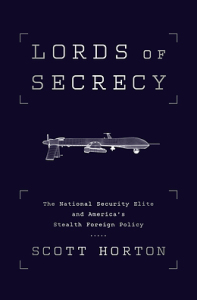
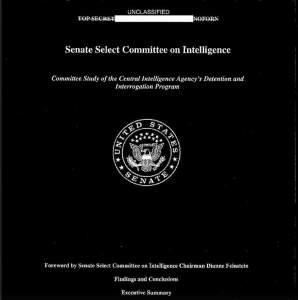
Senate Intelligence Committee Torture Report: Attorney Scott Horton
Guantanamo suicides, CIA interrogation techniques, CIA ordered physicians who violate the Hippocratic oath, are topics of some recent articles by returning guest attorney Scott Horton. Last month, he was on Democracy Now to debate former CIA General Counsel John Rizzo on the question of declassifying a Senate Select Committee on Intelligence report about the agency’s secret detention and interrogation programs. His book Lords of Secrecy The National Security Elite and America’s Stealth Foreign Policy will be published January 2015.
Attorney Scott Horton:
- I think the results flow directly from the media coverage (ABC poll on Torture report)
- Now major publications and broadcasters that hedged using the word torture have stopped doing that. There are only a handful of media sources that won’t do it. NPR being one of them.
- The media also presents roughly twice as much time devoted to people justifying the use of torture techniques to those criticizing it.
- Barack Obama who should lead the push back has gone completely silent. It’s beyond silent he talked about “tortured some folks” making it very casual, and then he said the torturers were patriots.
- I thought it was electrifying reading. 90 percent of it I’ve heard about before and still when you read them in this clinical, plain, highly factual style and things were developed with a continuous flow with lots of background in decision making in Washington at the top and how all this effected what happened on the ground.
- As a consumer of Congressional reports this probably the single most impressive Congressional oversight report I’ve ever seen.
- It’s an excellent example of what the oversight committee should be doing all the time.
- They’re doing this with respect to a program which was essentially or very largely wrapped up by October 2006.
- We’re talking about 8 1/2 years ago.
- They’re only able to do this kind of review in any depth when its historical, not when its real time oversight, that’s disappointing.
- One thing that emerges from looking at these reports and the military reports is that there is a huge black hole which has never been fully developed and explored and that’s JSOC, its the military intelligence side.
- That escaped review within the DOD process and it escaped review in CIA process and its clear that there’s a huge amount there.
- I certainly don’t expect prosecutions to emerge for the next couple of years in the United States, but I see a process setting in that may eventually lead to prosecutions.
- On the one hand we’re seeing a dangerous deterioration in relations with Russia, is an aggressor, which has seized territory in the heart of Europe, is waging a thinly veiled war on one of its neighbors. That is very unnerving to the major NATO powers.
- On the other hand there’s never been a period in the history of the alliance when there is so much upset at the United States.
- That’s come largely from the rise of the surveillance state and the role of the NSA.
- I was looking at this report, and we know that in 2006, there was an internal review that led the CIA to conclude that these interrogation techniques were ineffective and the CIA internally decided to seek a large part of the authority for EIT’s and operation of black sites rescinded.
- Another thing that’s very important here from this report, it tells us that Michael Hayden, George Tenant, Porter Goss and other very senior people at the CIA repeatedly intervened to block any form of punishment of people who are involved with torture and running the black sites.
- That’s important because of the legal document Command Responsibility. The law says when command authority makes a decision not to prosecute and immunize people involved with torture and abuse, that results in the culpability of these crimes migrating up the chain of command.
- I interviewed CIA agents who were involved in this program, and they told me they’ve all been brought out by legal counsels office and told – they may not leave the country.
- That means you’ve got roughly 150 CIA agents, including many people near the top of the agency who can’t travel right now.
- Lords of Secrecy The National Security Elite and America’s Stealth Foreign Policy
Guest – Scott Horton, human rights lawyer and contributing editor to Harper’s Magazine. Scott’s column – No Comment. He graduated Texas Law School in Austin with a JD and was a partner in a large New York law firm, Patterson Belknap Webb & Tyler. His new book Lords of Secrecy The National Security Elite and America’s Stealth Foreign Policy.
————————————————————————-
CIA Sponsored Terror, Civil Liberties, Criminalizing Dissent, Habeas Corpus, Human Rights, Political Prisoner, Prison Industry, Surveillance, Targeting Muslims, Torture
Podcast: Play in new window | Download

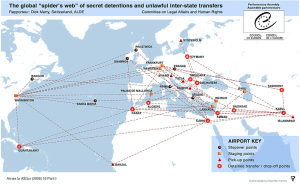
The Senate Intelligence Committee’s Report On CIA’s Detention & Interrogation
Attorney Michael Ratner:
- The Senate Committee on Intelligence started the investigation in 2007 after 92 tapes of water-boarding were destroyed by the CIA.
- That’s where the investigation began. In 2009, the Senate Committee still controlled by the Democrats spent 4 years going through millions of documents at a high cost to try and come out with a report on the CIA’s role on what they called detention and interrogation program.
- After 4 years they came out with a 6,700 in 2012 and they decided only to release the executive summary.
- Obama himself actually supported having more and more redactions.
- The redactions are stupid. Everybody knows in my field knows that Cobalt refers to what’s called the salt pit in Afghanistan which is a CIA run detention facility north of Kabal, or torture facility.
- Even if lives were saved its flatly illegal. You can’t kill a millions civilians because you want to save some of your soldiers.
- In the report they said that the CIA said before 911 that torture doesn’t work, its not effective.
- What Marnia Lazreg said in her book about torture in Algeria – she said it wasn’t really about information and it was about a macho empire that was in decline.
- What are you saying here – except this is about torturing Muslims, its about empire, and its about telling the world – you fall into our hands, we’re going to torture you.
- What they did was on the highest levels of the CIA, they went to places like the New York Times and the Washington Post and they wanted to be identified as a high level official and they leaked the stories of what they were doing in a way that would give them credit for it.
- I’m not hopeless about prosecutions, maybe not here, but somewhere in the world these people will be held accountable.
- This is only talking about what the CIA did at 9 dark sites around the world. The point I want to make is that there was torture going on at other places.
- 700 people went through Guantanamo, that’s the Rumsfeld techniques. Torture at Abu Gharib, torture at other U.S. prisons.
- We’re talking about a very small subset of U.S. torture.
- CIA sited Israeli Supreme Court ruling to justify torture. The Israeli ruling is that you can’t use torture except where there’s no other available means to prevent harm to other people.
- There’s no such thing as a ticking time bomb scenario that allows you to use it (torture)
- Go to CCRJustice.org, sign the petition
Attorney Michael Smith:
- The lying was more than I thought. The brutality was more than I thought. The corruption was more than I thought.
- On the lying, the report says no lives were saved as consequence to this program. We knew about water boarding but we didn’t know about rectal feeding or rectal hydration, where they left one man with a prolapsed rectum which means its hanging out.
- We didn’t know about killing people by chaining them to the floor in a cold room and dousing them with water.
- This program was run by 2 amateur psychologists, who didn’t know anything about Arab culture, who didn’t know anything about interrogation.
- They set up a corporation and the government gave them 81 million of our dollars to run this thing from 2001 to 2007, if you do the numbers these guys probably made 5 million dollars a year, less expenses.
- This is the most violent country in the world. The CIA is the epitome of this. Torture is illegal under American law, under international law. People who do it should be prosecuted.
- People who authorize it should be prosecuted, and there’s no talk about that.
Attorney Heidi Boghosian:
- My number one take away is something we’ve been covering for years is that no actionable intelligence came out as a result of these heinous practices.
- What also offends me greatly is hearing George W. Bush’s response that anyone who buys into this report or gives in credence, is somehow unpatriotic which fits into the whole propaganda that we’ve been fed, that questioning anything the government does, is an offense or an affront.
- These companies are profiting from torture.
——–
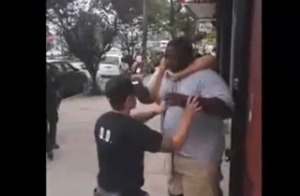

Eric Garner’s Public Defender Says Cops and Prosecutors “Are a Team in Every Case”
A recent Vanity Fair article titled Eric Garner’s Public Defender Says Cops and Prosecutors “Are a Team in Every Case” exposes the secrecy and conflicts of interest within investigations of police violence and how seven of the ten most-sued police officers of the 35,000-member New York Police Department happen to be in Staten Island. The article was written by attorneys Bina Ahmad, Joseph Doyle, and Michael Rooney public defenders in Staten Island with The Legal Aid Society. We also get a look inside grand jury proceedings and the often bias investigation from district attorney’s offices when looking into police wrongdoing. What steps are needed to structure fair court proceedings in these cases?
Attorney Bina Ahmad:
- Seven of the ten most-sued police officers of the 35,000-member New York Police Department happen to be in Staten Island.
- They still work there, they still testify in court, swear under oath, they’re telling the truth, they’re still violating our clients rights with impunity left and right, commit violent acts against them.
- The disparate treatment, of not only of the way our clients of color are treated, in a much more brutal way, but also in the way they’re charged and the plea offers that they’re given is very stark and very discriminatory in my mind.
- Many of us here at Legal Aid and other criminal defense attorneys around the city . . . we try to get the personnel records of officers who have been accused of brutality or violating people’s Constitutional rights, and (see) what they’ve been disciplined for within the NYPD.
- Abuses include – strip searching people on the street, full cavity search for people on routine stops, brutalizing people for not complying with a simple order.
- A few colleagues of mine had represented him (Eric Garner) in the past. Attorney Joseph Doyle was working to take a case to trial for him. A lot of people knew Eric Garner, and they called him the “gentle giant.” A large man, but known to be gentle and sweet, father of six.
- When the news came out that he was killed, it was incredibly difficult for us. Not only for us but for our clients.
- To task a local D.A’s office to prosecute one of their own, a local member of the local police department, particularly in such a small borough, you’re expecting them to prosecute a member of their own member of their team.
- Every judge knows they have to recuse themselves from a case if they have a relationship with any of the parties involved.
- With the D.A. they don’t have that obligation. They work on cases together. They prep them for testifying at trial to be a prosecution witness.
- Choke holds were banned as a practice a while ago as part of police protocol. The fact that a police used one was a violation of police protocol.
- We are not allowed in the grand jury room for any moment except for if your client chooses to testify. If our client chooses to testify, we can’t protect them at all.
- They take the stand, they’re cross examined by the D.A. Everything they say can and will be used against them later.
- The D.A. control everything, the narrative, what evidence is shown, what witness testifies, what questions the witness is asked.
- It would be up to the grand jury to feel empowered to ask more questions.
- Any eye witness that would come in as a prosecution witness, where they’re supposed to be getting an indictment on a cop. They’ll be testifying for the prosecution but what we’ve seen in these minutes is the way the district attorney these prosecution witnesses – they’re acting like they’re cross examining them.
- They’re actually trying to break down their testimony or poke holes in their testimony.
- They suddenly become a defense attorney when the cop is on the line.
Guest – Attorney Bina Ahmad, staff attorney in the criminal defense practice department of the Legal Aid Society and National Vice President of the National Lawyers Guild.
——–

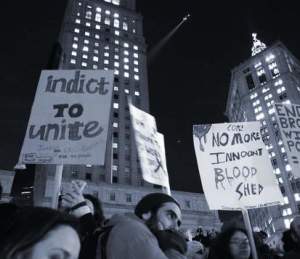
Foley Square Demonstration: Voices From The Protest
We hear some of the voices of demonstrators assembling at Foley Square during the first protest against the grand jury decision failing to indict those officers responsible for choking Eric Garner to death.
————————————————————————————————-

Please help support Law and Disorder by clicking on Fractured Atlas graphic (link is fixed). This radio show is now a sponsored project of Fractured Atlas, a non-profit arts service organization. Contributions for the charitable purposes of Law and Disorder must be made payable to Fractured Atlas only and are tax-deductible to the extent permitted by law. You can donate as little as 5.00 a month.
CIA Sponsored Terror, Civil Liberties, Criminalizing Dissent, Death Penalty, Guantanamo, Human Rights, NSA Spying, Political Prisoner, Surveillance, Torture, Truth to Power
Podcast: Play in new window | Download
Updates:
Michael Ratner: Is Congress’ Decision On Obama’s Plan To Close GTMO Really A Setback As Newspapers Report?
- Congress was considering whether to allow Guantanamo detainees to be resettled in the United States.
- That’s something Obama wants to do because so far he’s been unwilling to settle them in other countries.
- That bill failed and so when we get the NDAA or whatever legislation it will be put in, it will have transfer restrictions of a sort but it will not permit detainees to be transferred to the United States.
- Obama has had 6 years to make good on his promise that he would close Guantanamo in a year.
- Guantanamo remains, more than 142 people. More than half 73, have been cleared for release.
- On January 11, 2015, I urge all of us to get in the streets demonstrate and tell Obama to shut it down.
——-
Michael Ratner: The Right Livelihood Awards In Stockholm, Sweden
- I just came back from Stockholm, Sweden where the Right Livelihood Awards, also known as the alternate Nobel Prize are given out annually.
- Amy Goodman has received such an award. This time there were five awardees.
- One of whom is Edward Snowden. That was one of the reasons I was there because who are involved in defending protecting whistleblowers were in Stockholm for that award.
- The awards are not given by the Swedish government. Sweden is not a progressive government. It’s tied with Israel as the 3rd biggest arms dealer in the world.
- Sweden did recognize that Palestine should be a state.
United Nations Committee May Question U.S. Officials On Handling Of Michael Brown Shooting
——-
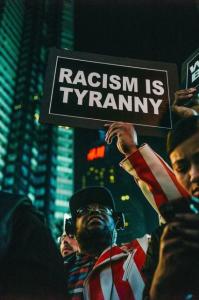

Ferguson: It is Right to Resist, By Any and All Means Necessary
Two weeks after the non-indictment of former officer Darren Wilson over the killing of Michael Brown, protests continue nationwide from classrooms to places of work. Will a genuine movement gain traction in the wake of outrage and defiance to the grand jury decision? A movement coalescing against police violence will need to confront police, and resist the legitimacy of the state writes Glen Ford founder of the Black Agenda Report. He says the people of Ferguson’s mass violations of the curfews and countless decrees of the militarized city, county and state police were, by definition, illegal acts – which is what made the small town a model of resistance.
Glen Ford:
- Not to belittle all the work people have put into this. There’s been a pent up energy that has been building and I mean for literally decades. We have to compare this explosion as you call it of activism to the period of quietude for decades even as the contradictions that led to Michael Brown’s murder and a multitude of murders kept on becoming more acute.
- We have to understand that there were forces that were keeping a lid on the explosion, and finally those forces could no longer do so and we see the explosion in 170 or more cities.
- Black folks have never trusted the police and never had any reason to trust the police. It’s never been about trust its been about power. The power of a community to protect its youth, its sons and daughters from being gunned down on the streets by these police or sucked up into the mass black incarceration machinery.
- The helplessness has not been something inherent to black folks its because we’ve had a kind of fifth column in our midst that we at Black Agenda Report call the black misleadership class which has engaged in very enthusiastic collaboration with the same people who created this black mass incarceration state.
- Back in June there was a vote in the house and the senate on a bill that would’ve prevented the Pentagon from transferring its weaponry and all of its militarized gear to local and state police departments.
- Four out of five Congressional Black Caucus members either voted against that bill or abstained. 32 out of the 40 members, so 80 percent of the Congressional Black Caucus. I guess its fitting that they stand in for this black misleadership class. They were financing the murder of people like Michael Brown.
- So, this is our problem, that these are the people that keep the lid on.
- What should be an ongoing, not simmering distrust, but an ongoing explosion of resistance.
- All of this started in terms of legislative form with the Law Enforcement Assistance Administration that was part of an omnibus crime bill that was passed in 1968 signed by Lyndon B Johnson which began by transferring massive federal resources to local police departments.
- It’s been gradual, steady and now institutionalized.
- This is the movement that does not yet have a name and it doesn’t have a name because its not yet clear about its objectives.
- The response to this civil rights and black power movement was the mass black incarceration state.
- Community control of the police and its a very very difficult subject. It was the subject that the Black Panther Party was born to tackle.
- The community should be empowered to fire police, just like communities are being empowered through their mayor to fire teachers.
- This movement can’t treat police as legitimate, that is coercive mechanisms of the state.
- Their police, their security apparatus, their intelligence apparatus has to be seen and opposed as illegitimate.
- He’s always in a huddle with President Obama (Al Sharpton) and that’s why I call him “king rat.”
- The real ratting that he does is that he goes across the country and he makes an assessment of who is in opposition to the administration’s policy or mass incarceration order and then goes right back to the commander and chief of the regime and tells him who might be creating trouble and how those troublemakers can be neutralized. That’s the real rat.
- Mass arrests and provocateurs and such. This is what Sharpton’s really talking about when he talks about the full weight of the president’s office.
Guest – Glen Ford, founder of the Black Agenda Report and many other media forums. Ford was a founding member of the Washington chapter of the National Association of Black Journalists (NABJ); executive board member of the National Alliance of Third World Journalists (NATWJ); media specialist for the National Minority Purchasing Council; and has spoken at scores of colleges and universities.
——-


Ohio Republicans Push Law to Keep All Details of Executions Secret
Republican lawmakers in Ohio are rushing through one of the most extreme secrecy bills yet attempted by a death penalty state. It’s called HB 663 and it withhold information on every aspect of the execution process from the public, media and even the courts. Ohio has experienced four botched executions in eight years. The most recent was the 26 minute death of Dennis McGuire in January 2014. An experimental two-drug combination was used and it was reported that Dennis was gasping and fight for breath. Another aspect of HB 663 is that seeks to undermine strict distribution controls that have been placed on foreign companies that manufacture pentobarbital.
Attorney Mike Brickner:
- They’re really trying to ram through the last few weeks of our lame duck session.
- I think they want to resume executions here in the state of Ohio in 2015.
- We’ve had a moratorium on executions since the beginning of 2014 when we had a botched execution of Dennis McGuire and the federal court has been trying to come with new protocol, new drugs that won’t lead to a botched execution.
- I think the legislators want to move forward with the next scheduled execution in February so they’re trying to push it through as quickly as possible.
- I think they’re interested in secrecy because of all the controversy that has plagued Ohio executions over the last decades.
- I think this a natural concern from the government – when something is not going well, they want to hide it from the public.
- Unfortunately that never really works out well for the government because when you operate in secret, the only things that follow are corruption, abuse, negligence and incompetence.
- The legislation would shield anyone who really touches the lethal injection process from public records laws.
- For those medical professionals who advise or assist on the executions, it would prevent the state licensing board from holding them accountable for violating their oath.
- Unfortunately bad ideas often travel quickly. We have five states with secrecy legislation of some sort in place, we have 15 states that tried to enact secrecy legislation.
- Compounding pharmacies are smaller companies, often one or two pharmacists. They make small batches of drugs made to order. They’re not regulated in any meaningful way by the FDA.
- When they make these drugs in small batches, one batch could be more effective or less effective than another batch. When you’re talking about a lethal injection where you need to insure a humane and constitutional way, if you have a drug that’s being used in the lethal injection process that’s not effective, you have a very high chance of that person going through an execution that will violate our constitution.
- We have to accept that the death penalty does exist in states like Ohio and if we are to have the death penalty then we need to make sure that it complies with our laws and that those who are subjected to the death penalty are not treated inhumanely and in a way that will violate our constitution.
- I think we can do that while moving toward abolishing the death penalty.
Guest – Attorney Mike Brickner, senior policy director of the American Civil Liberties Union (ACLU) in Ohio. Brickner recently opposed the new bill in front of a committee at the Ohio State legislature. In 2013, Mike co-authored two reports focusing on the intersection of poverty and the criminal justice system. The Outskirts of Hope: How Debtors’ Prisons are Ruining Lives and Costing Communities chronicled how courts were illegally imprisoning low-income Ohioans because they could not afford to pay their fines. The report culminated in the Ohio Supreme Court increasing education and training for court personnel and issuing bench cards with clear rules for collecting fines and court costs. He also co-authored and designed the ACLU’s April 2011 report, Prisons for Profit: A Look at Private Prisons. The report highlights the problems faced by other states who have privatized prisons, including: increased costs, safety problems, a lack of transparency, and increased recidivism.
—————————————————————————–

Please help support Law and Disorder by clicking on Fractured Atlas graphic (link is fixed). This radio show is now a sponsored project of Fractured Atlas, a non-profit arts service organization. Contributions for the charitable purposes of Law and Disorder must be made payable to Fractured Atlas only and are tax-deductible to the extent permitted by law. You can donate as little as 5.00 a month.
CIA Sponsored Terror, Civil Liberties, Criminalizing Dissent, FBI Intrusion, Habeas Corpus, Human Rights, Political Prisoner, Prison Industry, Surveillance, Targeting Muslims, Truth to Power
Podcast: Play in new window | Download
Updates:
- Hosts Discuss Mass Demonstrations In Wake Of Ferguson Grand Jury Verdict
—-
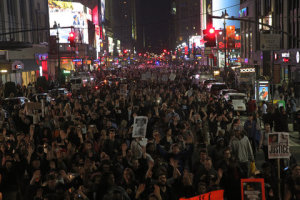

Mumia Abu Jamal Responds To Grand Jury Not Indicting Ferguson Police Officer Darren Wilson
We talk today about the wide scale pattern of police violence against people of color in the context of the grand jury decision in St. Louis, Missouri to not indict Ferguson police officer Darren Wilson for the fatal shooting of Michael Brown, an unarmed 18 year old African American. The decision sparked more outrage within the community of Ferguson and launched tens of thousands into the streets in cities across the country. The grand jury is comprised of 12 members and 10 out of the 12 would have to agree to indict. The grand jury had a number of choices, such as first degree murder, second degree murder, voluntary manslaughter or involuntary manslaughter. First degree murder would have required evidence that Wilson set out to kill Brown. Second degree murder charges were possible, but this choice was unlikely if jurors decided that Wilson was negligent when he shot Brown, they could have gone with a charge of voluntary or involuntary manslaughter.
Mumia Abu Jamal:
- When you think back through American history, there are actually few periods where you see this range of protest.
- You’ll see throughout the 20th century protest. Think about April 4, 1968, the day Martin Luther King Jr. was killed and you saw protests all across the country over hundred cities.
- And look what happened a few hours ago, perhaps a greater range of protest in over 170 cities tells you I think better than anything I can say, that things are very bad indeed for the African American community and their expectation of justice in this system.
- Think about the weather, people coming out in the dire cold, right, to protest at night. That’s not an easy thing, people don’t do that easily and they do it at considerable risk and some danger.
- That speaks to the depth of the feeling in their hearts that something is broken in the American justice system.
- The recent midterm election was the lowest turnout since the 1940s. That says something about American discontent with the political system.
- It actually reminds me about the demonstrations before the 2003 Iraq War, where all around the world in hundreds of countries you saw demonstrations that were unprecedented.
- People feel that. Now that can dissipate until a new provocation.
- This is the time where organizers should be on their p’s and q’s and out there taking phone numbers and taking emails and building lists.
- To stand up at this moment, the first African American president in America’s history and talk about that people need to observe and respect the rule of law is I think frankly absurd.
- Barack Hussein Obama was born August 4, 1961. In that year there were about 20 states that made it illegal for a white person to marry a black person.
- People went to jail for what they called interracial fornication.
- When you talk about the rule of law, you have to talk about the rule of right and the rule of wrong.
- To quote John Africa, who said just cause its legal don’t make it right.
- We live in a country that legalized slavery.
- Many things are done in the name of law, but they’re wrong, they’re simply wrong.
- I was reading in the USA Today last week, (I’m little behind in my reading) they said 461 people were killed by police in 2013.
- This is something that’s systemic in the United States, and the people are trying to draw attention and I don’t think its successful, but its a damn good beginning.
Guest – Mumia Abu-Jamal is a renowned journalist from Philadelphia who has been in prison since 1981 and was on death row since 1983 for allegedly shooting Philadelphia police officer Daniel Faulkner. After decades of appeals, he left death row in 2012 but is still facing a life sentence. He is known as the “Voice of the Voiceless” for his award-winning reporting on police/state violence brutality and other social and racial epidemics that plague communities of color in Philadelphia and throughout the world.
—-

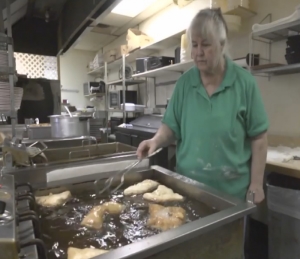
Civil Forfeiture: Federal Government Seizes Property Of Business Owners
In May of 2013, two Internal Revenue Service agents seized the checking account of Carole Hinders and the 32 thousand dollar balance. Hinders was accuses of structuring her deposits to be less than 10 thousand dollars to avoid filing required government reports. This is a tactic often used by drug dealers and other criminals to move money around without detection. However, Carl Hinders owns a Mexican restaurant and her business is cash only. She did explain to the IRS agents that she made deposits almost daily to avoid having thousands of cash on hand. Hinders wasn’t charged with a crime, yet the IRS still seized the money. There are many cases of civil forfeiture similar to Carol’s where the property is taken without proper due process and investigation.
Attorney Larry Salzman:
- Civil forfeiture is a set of laws that allow government agencies to take your property when they suspect its been involved in crime but they don’t need to charge you with any crime to take that property.
- One of the incredible things about civil forfeiture is that the agencies that seize your money based on a mere suspicion actually get to keep that money to fund their agencies.
- That’s true in most states and also for the federal law.
- Every state is engaged in civil forfeiture. Minnesota had a reform. They no longer use strictly civil forfeiture, they’ll only take your property after you’ve been convicted of a criminal offense.
- The federal government uses it (civil forfeiture) almost every major agency of the federal government, the Drug Enforcement Administration, the IRS, the DHS, ICE.
- You can’t have both civil forfeiture and an impartial enforcement of the law if the agencies enforcing that law get the money.
- In federal cases there’s another lack of due process. The federal agencies seize cash like a bank account, the law doesn’t provide any prompt post seizure hearings. So, there’s no right for you to quickly contest the validity of the seizure. You might wait a hear without your money before you get to see a judge.
- It’s very hard to get it back because it means mounting a full scale defense in state or federal court against well funded prosecutors.
- There’s that financial incentive, so the government is doing more and more of these civil forfeitures as their budgets are coming under constraint.
- If local law enforcement involves themselves in a federal forfeiture action, they’ll get paid a bounty by the feds for their participation. That becomes a very meaningful part of police department budgets.
- That equitable sharing program has ballooned from nothing to something over 450 million dollars a year given to local police departments.
- We’re seeing it again with another set of clients. We have 3 brothers who own a convenient store distribution business on Long Island, the IRS again took 446 thousand dollars from them.
- This is a modest business almost all of that money was money that was owed to vendors for inventory. They grabbed their bank account when it was its fullest basically. The allegation again was structuring.
- There’s not even a civil forfeiture action that’s been filed, that’s a violation of law in itself the government’s committed.
- Many of the worst aspects of civil forfeiture were ushered in on the premise that they were needed to combat drug trafficking but now we see civil forfeiture being used to treat legitimate small businesses like criminals, just because they’re making frequent cash deposits.
Guest – Attorney Larry Salzman is with the Institute for Justice. He joined the Institute in April 2011 and litigates cutting-edge constitutional cases protecting individual rights, including free speech, property rights, and economic liberties, in federal and state courts. He is originally from San Diego. His commitment to both entrepreneurship and law is reflected in his career prior to joining IJ. Larry co-founded an ecommerce company with his family in 2000, while attending law school at night, and returned to the business for several years as CEO upon its sale in 2007. During the interim, he was an attorney with Pacific Legal Foundation, in Sacramento, California, litigating property rights cases in federal and state courts, and served as a clerk to Judge Bohdan A. Futey on the United States Court of Federal Claims. Larry received his law degree in 2002 from the University of San Diego, where he was Assistant Editor of the San Diego Law Review. He received an undergraduate degree in Finance from Arizona State University in 1993.
——————————————————————————————————————————–
Afghanistan War, CIA Sponsored Terror, Civil Liberties, Criminalizing Dissent, Guantanamo, Habeas Corpus, Human Rights, Prison Industry, Targeting Muslims, Torture, Truth to Power
Podcast: Play in new window | Download
Updates:
- Michael Ratner: U.S. President Barack Obama To Seek Additional War Powers From Congress
——

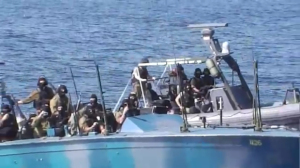
ICC Says Gaza Still Occupied, Israel May Have Committed War Crimes, But Court Refuses To Hear
Attorney Michael Ratner:
- When I’m in Berlin I see there’s a ICC decision by the prosecutor.
- People probably remember the attack on the Gaza flotilla, particularly the Mavi Marmara. One of 8 boats that were sent from Europe and other places, Turkey, to try and break the blockade that Israel had imposed on Gaza.
- Israel has been blockading Gaza forever essentially but it put in a very serious naval blockade in 2009 and no boats from the Mediterranean could approach within 20 miles of what Israel called its blockade.
- The Gaza Flotilla was established in 2010 to try and break the blockade it had 8 ships, one was named the Rachel Corrie.
- They were at least 80 miles away from Gaza, hadn’t even got into the blockaded territory when the Israeli commandos, the IDF made a raid on those boats.
- Particularly on the Mavimarmara which was a Turkish boat – the fact that the boat was registered in Comoros gave the ICC jurisdiction over the raid.
- People may recall the raid. Israeli commandos shimmied down on ropes from helicopters on to the Mavimarmara and they killed 9 people. A tenth died later.
- Ultimately, Comoros made a complaint to the ICC that – Israel attacked this flotilla even outside the 20 mile blockade zone, they committed war crimes. War crimes in that they were attacking civilian boats. War crimes in that they were killing civilians.
- Here I am sitting in Berlin thinking about the 76 anniversary of Kristallnacht, the tearing down of that wall, Raji Sourani from Gaza not being able to get in, and this ICC decision comes down.
- The ICC prosecutor says there’s a reasonable basis that war crimes were committed by the IDF in their attack on the Gaza Flotilla.
- The next sentence said as part of that finding Gaza was an occupied territory of Israel. That’s of great significance because when you’re an occupying force the laws of war apply. If you commit war crimes, if you kill people – civilians or intentionally targeting them or attack civilian objects.
- The third sentence is while we find that there was a reasonable basis that the IDF committed war crimes and that Israel continues to occupy Gaza despite its claim in 2005 that it left Gaza we are not going to take jurisdiction and further investigate the case, because the crimes were not essentially severe enough, big enough, enough of them . . . and therefore we’re not going to take this case.
- To look at them in an isolated way and not part of a stream of war crimes Israel has been committing since 1948 is outrageous.
- The Situation on Registered Vessels of the Union of the Comoros, the Hellenic Republic and the Kingdom of Cambodia
Law and Disorder Co-host Attorney Michael Ratner, President Emeritus of the Center for Constitutional Rights (CCR), a non-profit human rights litigation organization based in New York City and president of the European Center for Constitutional and Human Rights (ECCHR) based in Berlin. Ratner and CCR are currently the attorneys in the United States for publishers Julian Assange and Wikileaks. He was co-counsel in representing the Guantanamo Bay detainees in the United States Supreme Court, where, in June 2004, the court decided his clients have the right to test the legality of their detentions in court. Ratner is also a past president of the National Lawyers Guild and the author of numerous books and articles, including the books Who Killed Che? How the CIA Got Away With Murder, The Trial of Donald Rumsfeld: A Prosecution by Book, Against War with Iraq and Guantanamo: What the World Should Know, as well as a textbook on international human rights.
———

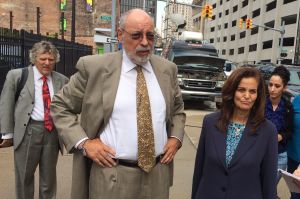
U.S. Government Finds 67-year-old Palestinian-American Rasmea Odeh Guilty
Earlier this summer we reported on Rasmea Odeh’s case. She’s a 67 year-old Palestinian American, community activist and teacher. In the fall of 2013, she was arrested by Department of Homeland Security for failing to disclose a 1969 conviction in an Israeli military court and charged with unlawful procurement of naturalization. Odeh, her father and fiancee were brutally tortured in an Israeli prison in 1969, which was related to a bombing in a Jerusalem supermarket. Israelis extracted a confession from Odeh and she spent 10 years in an Israeli prison where she was tortured and sexually assaulted.
Last week, Rasmea Odeh was found guilty of one count of Unlawful Procurement of Naturalization. For over a year, Rasmea, her supporters, and her legal team have been battling this unjust government prosecution, saying from the start that the immigration charge was nothing but a pretext to attack this icon of the Palestine liberation movement. And although there is real anger and disappointment in the jury’s verdict, it was known as early as October 27th that she would not get a full and fair trial, because Judge Gershwin Drain made it nearly impossible for her defense.
Attorney Michael Deutsch:
- This case emanates from the FBI and the US Attorney in Chicago investigating the work of the Arab American Action Network and other people who were doing Palestine solidarity work in the Chicago area and throughout the Midwest.
- They were bringing speakers here from Palestine to educate people
- As a result of that work they were targeted by the FBI. Ultimately in September of 2010, the homes 7 activists were invaded. All their political material was taken. There was a Grand Jury that convened and 23 activists were subpoenaed and they also sought the records of the Arab American Action Network.
- The U.S. Attorney of Chicago sent a request to Washington to look into the records of Odeh in Israel.
- After several years, the Israelis came up with documents that showed she was arrested in 1969, put on trial by a military tribunal in the Occupied Territories.
- . . found guilty, horrifically tortured, confessed as did her co-defendants, sentenced to life in prison, put in an Israeli prison, tried to escape in 1975, caught in a tunnel, trying to get out.
- As a result of this they looked at her Naturalization application and saw that she said no as to whether she had ever been arrested, convicted or in prison and the commenced a criminal investigation and indicted her 9 years after she had gotten her citizenship. Months before a statute of limitations would have run on this charge.
- We put forward a multi-level defense. One, we said that anything that was produced by the military court, the military judicial system was illegitimate, illegal – you’re tried by soldiers posing as judges. We said that she had been horrifically tortured and we had someone evaluate her over many days and hours, this woman who is one of the leading experts on torture said she (Rasmea) still suffers from PTSD.
- That would have caused her when she filled out the application to cognitively block what had happened to her 40 years prior in Israel and therefore she wasn’t intentionally lying.
- The judge refused all our motions, all our defense. He wouldn’t let her (Rasmea) testify about her torture, about her condition, or her innocence. All that was blocked by motions of the government.
- We went to trial basically with our hands tied behind our backs.
- What was a shock to me was the judge locked her up, pending sentencing. Now she sits in a county jail in Port Huron, Michigan for five months before the sentencing and obviously if the judge is not going to give her bail pending sentencing, he’s not going to give her bail pending appeal.
- Judge Gershwin Drain who is African American who at first was kind of sympathetic and supportive and initially said we were allowed to put on our PTSD expert and put on a PTSD defense. Then all of a sudden the government put a move to reconsider, he changed his mind and basically gutted our trial.
- We know of efforts all over the country to suppress student activity (around issues of Israel – Palestine)
- We have to convince the judge to let her out on an appeal bond. Even after all that if she’s sentenced, she’s going to go to prison and then when she’s done with her prison sentence, they’re going to put in her into immigration prison and they’re going to deport her.
Guest – Attorney Michael Deutsch, after clerking for United States Court of Appeals Judge Otto Kerner, Mr. Deutsch went into private practice, joining People’s Law Office in 1970 where he has represented political activists and victims of police and government civil rights violations. His advocacy has taken him all around the world, including to hearings in the United Nations. He has tried many civil and criminal cases in federal and state courts, and has written and argued numerous appeals, including several in the United States Supreme Court.
—–


Food Chains Documentary Film Opens Nationwide This Week
The documentary film Food Chains opens nationwide in the United States this month. The film brings you into the world of a Florida farmworker led effort to hold responsible the 4 trillion dollar global supermarket industry. The CIW is doing so through the Fair Food program. That’s the program which partners growers and retailers to improve working conditions for farm laborers in the United States. For years, farmworkers often endure abuse, wage theft, and have been beaten and sexually harassed. Food Chains’ producers include Eva Longoria and Eric Schlosser. Find out about screenings and action to take at www.ciw-online.org
Saturday November 22 – 1:00pm: Screening of Food Chains & Post-film Panel CIW-Quad Cinema (34 W 13th St) Food Chains also playing on Sat. Nov 22 at 7:45pm
Protest & March to Wendy’s Meet at Union Square Wendy’s (20 E. 14th St) Facebook
Guest – Gerardo Reyes Chavez, has worked in the fields since age 11, first as a farmer in Zacatecas, Mexico, and then in the fields of Florida picking oranges, tomatoes, and watermelons. He joined the Coalition of Immokalee Workers, a Florida-based human rights organization, shortly after his arrival in the United States in 2000, when his fellow farm worker roommates, who had previously escaped a violent slavery operation hidden in the swamp south of Immokalee, Florida, invited him to come to the CIW’s Wednesday evening community meetings.
——————————————————————————

Please help support Law and Disorder, the show is now a sponsored project of Fractured Atlas, a non-profit arts service organization. Contributions for the charitable purposes of Law and Disorder must be made payable to Fractured Atlas only and are tax-deductible to the extent permitted by law.
CIA Sponsored Terror, Civil Liberties, Criminalizing Dissent, Human Rights, Military Tribunal, Political Prisoner, Surveillance, War Resister
Podcast: Play in new window | Download


Civil Liberties Infringement In Wake Of Ebola Panic
The Ebola quarantine protocol in the United States is bringing issues of public health and individual constitutional rights to the front. The Center For Disease Control and Prevention has made clear that the Ebola virus doesn’t become contagious until symptoms appear. Even if symptoms are present, transmission of the disease requires contact with bodily fluids such as blood or vomit. Given this, if you are suspected of having the virus but don’t have any symptoms, can the state to issue a mandatory quarantine?
Attorney Donna Lieberman:
- What we’re seeing is the rush to policies driven instead of by legitimate public health concerns and Ebola is a legitimate serious public health concern, policy driven by fear.
- This is where civil liberties and good medicine go hand in hand.
- Good civil liberty policy is policy that respects individual liberty and does not curtail individual liberty unless there’s a real good reason to do so and there’s no way to protect society without doing so.
- We don’t object to quarantines under all circumstances.
- There are sometimes when the public health requires that society be protected from individuals who are infectious.
- If somebody is not infectious does not pose a danger to society by virtue of their physical condition well then, its unacceptable.
- If they show no signs of infection, that means they’re not contagious, they should not be quarantined, they should simply be monitored.
- Medical people don’t go and risk their lives to treat people who are facing horrific epidemic and then come to infect their friends.
- HIV was an epidemic in the United States, the response to Ebola is based on a tiny handful, a tragic handful to be sure, but a tiny handful of cases and is really way out of proportion and there’s this unspoken fear of related to coming from Africa – here, and it feels as there is a racial component, its just a feeling.
- What’s an appropriate health policy, driven by medicine not by fear?
- Some of the ACLU affiliates are pursuing FOIA requests to find out what policies are in place.
- We are pressing for the state of New York to relax its quarantine policies and make it a public health driven policy rather than a fear based policy.
Guest – Attorney Donna Lieberman, has been executive director of the New York Civil Liberties Union since December 2001. She has also served as the associate director (1988 – 1993) and founder/director of the NYCLU Reproductive Rights Project (1990 – 2000). Under Lieberman’s leadership the NYCLU has expanded the scope and depth of its work, supplementing and strengthening the pursuit of litigation with an aggressive legislative advocacy and a field organizing program that works on behalf of civil liberties and civil rights. As a result, the organization is widely recognized as the state’s leading voice for freedom, justice and equality, advocating for those whose rights and liberties have been denied, especially for those most marginalized by society.
——–
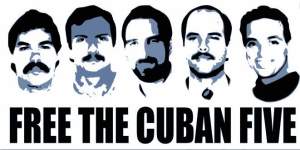
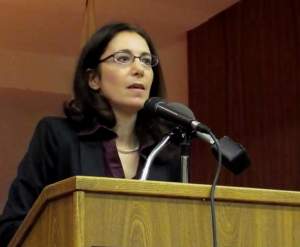
Cuba In The News, The Cuban Five and Exposing Journalists For Hire
Lately, Cuba and its relationship to the United States has been in the news. The New York Times alone had 4 editorials on Cuba. Several urged the reestablishment of diplomatic relations with Cuba which were severed more than 50 years ago. Another urged the prisoner exchange of the Cuban Five now 3, and Alan Gross, the American who has been in a Cuban prison for several years. Last year attorneys with the Partnership for the Civil Justice Fund filed a Freedom of Information Action lawsuit against the U.S. State Department for its refusal to produce responsive materials in its possession about secret payments by the U.S. government to Miami-based journalists who were “reporting” on the Cuban Five case before and during the trial and while the jury deliberated.
Attorney Mara Verheyden-Hilliard:
- The Cuban Five, are five Cuban men who came into the United States to basically learn what the terrorists in Miami were planning. Cuba is a country that has been subject to terrorist attacks for decade after decade.
- There have been bombings, planes shot down. A huge amount of death and destruction but it comes out of the United States from anti-Castro in Miami who are reeking terror on the people of Cuba.
- The U.S government has never taken action to stop these terror attacks that emanate from their shores. In fact the CIA has had been known to have at least some of these people on their payroll or working with them over the years.
- Ultimately, they (Cuban Five) uncovered information which was shared with the FBI, from the Cuban government to the FBI. What happened was the terrorists weren’t arrested, these men were arrested.
- They were charged with espionage offenses, put on trial and found guilty.
- The issue is . . they were tried in Miami, they were tried in this heated environment, tried in conditions that there was no way they could have gotten a fair trial. An issue that has been repeated over and over again in the years of appeals.
- What has been uncovered more recently is that the U.S. government had journalists on their payroll who were presenting themselves as independent journalists in Miami who filled the airwaves and newspapers with extremely hostile and inflammatory coverage of Cuba as well as the trial itself.
- There’s no way this couldn’t have had an impact, on the jury, on the jury pool, on the sitting jury.
- The U.S. government itself is prohibited by the Smith-Mundt Act of 1948 from funding activities to influence and propagandize public opinion.
- We live in a country where we’re free to be wire-tapped, spied on, to have the FBI infiltrating religious institutions and monitoring peaceful protests.
- Prisoner exchange: The fact is the Cuban Five were not attempting to undercut or destabilize the U.S. government. They were simply trying to get information about terrorist attacks emanating from the United States, hurting the people of their country. Alan Gross on the other hand was sent as part of a covert U.S. government operation into Cuba multiple times to material, satellites, phones, communication material, in an attempt to destabilize and over throw the Cuban government.
- We have fought for years with Freedom of Information Act demands and working in partnership with the National Committee to Free the Cuban Five and Gloria LaRiva who has led that organization. She is the key person in the National Committee to Free the Cuban Five that raised this issue, that spent a huge amount of time, going through records, going through the records, audio and visual of the different media, television and radio – and linking these together and doing research into these journalists and establishing what appeared to be this covert operation.
- Much of that material is up on a website called ReportersForHire.org
- Because the State Department was clearly holding material within a certain time period and had not searched their records at all for the material we demanded, we filed a lawsuit in Federal court, and that’s a lawsuit we’re still in the process of litigating.
- The issue of the blockade, which on its face, starving a population to try and force them to change their government is really criminal and a violation of international law.
- Standing on its own without the U.S. blockade, Cuba would thrive.
- Cuba is still there and has withstood and been strong through all of this.
- By lifting the blockade and allowing the U.S. to penetrate into Cuba with American capitalism would be another way of attempting to over throw the government of Cuba.
- A major major funding stream for these groups and these entities in Miami who are working against the people of Cuba and against the government of Cuba.
- US Army Col Lawrence Wilkerson Letter To Obama.
Guest – Mara Verheyden-Hilliard, co-chair of the Guild’s National Mass Defense Committee. co-founder of the Partnership for Civil Justice Fund in Washington, DC, she secured $13.7 million for about 700 of the 2000 IMF/World Bank protesters in Becker, et al. v. District of Columbia, et al., while also winning pledges from the District to improve police training about First Amendment issues. She won $8.25 million for approximately 400 class members in Barham, et al. v. Ramsey, et al. (alleging false arrest at the 2002 IMF/World Bank protests). She served as lead counsel in Mills, et al v. District of Columbia (obtaining a ruling that D.C.’s seizure and interrogation police checkpoint program was unconstitutional); in Bolger, et al. v. District of Columbia (involving targeting of political activists and false arrest by law enforcement based on political affiliation); and in National Council of Arab Americans, et al. v. City of New York, et al. (successfully challenging the city’s efforts to discriminatorily restrict mass assembly in Central Park’s Great Lawn stemming from the 2004 RNC protests.)
——

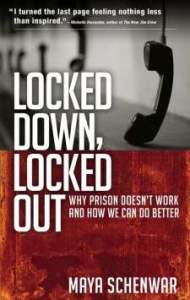
Locked Down, Locked Out: Why Prison Doesn’t Work and How We Can Do Better
In this country there are 2.3 million Americans locked up in prison, and 95 percent of prisoners that are released emerge with very little opportunity to rebuild their lives. Our guest journalist Maya Schenwar has written about the social destruction of the prison industry and the community based initiatives to help former inmates in her book Locked Down, Locked Out: Why Prison Doesn’t Work and How We Can Do Better. Locked Down, Locked Out begins by examining the fundamental crisis of how prison breaks apart families and communities. These experiences relay the enormous damage caused by severing millions of people from family and community ties. In exploring alternatives to incarceration Maya suggests ways to provide resolution to victims while repairing communities of color.
Maya Schenwar:
- It started about ten years ago which was when my sister went to juvenile.
- I had been corresponding with someone on death row, and I had an inclination to write about this issue at the time was really on the margins of journalism.
- When my sister went to juvenile detention and I went to visit her I was immediately struck by the fact that this detention center was a jail.
- Fourteen year olds were being locked up.
- You’re taking people who have already been traumatized and putting them in the most isolating conditions, separating them from society in this way that can’t help create further trauma.
- Prison just doesn’t work. About 2/3 of people who are released from prison are re-arrested in 3 years.
- Instead of talking about the law, we’re going to be talking about the harm that was done to you. A very different thing.
- There needs to be a victim centric approach, something that takes the victim’s healing into consideration.
- Sometimes it gets lost in the conversation about mass incarceration that every single person occupying a prison is a human being and therefore has a constellation of connections with people on the outside when they go in.
- Prison becomes this process of breaking each of those links.
- When you’re communicating with a person in prison, you can’t call them they have to call you. You have no idea when they’ll be able to call you.
- Letters become the only reliable form of communication.
- It comes down to the community level, it comes down to erasing this idea we have that there is a one size fits all solution.
- So many of those problems stem from things we’re depriving people of in our society like housing, food, shelter. We have to think about providing those things as part of creating a society with less harm and less violence.
Guest – Maya Schenwar, is Truthout’s Editor-in-Chief. Her book, Locked Down, Locked Out: Why Prison Doesn’t Work and How We Can Do Better, Berrett-Koehler Publishers. Previously, she was a senior editor and reporter at Truthout, writing on US defense policy, the criminal justice system, campaign politics, and immigration reform. Prior to her work at Truthout, Maya was contributing editor at Punk Planet magazine.
—————————————————————————————

Please help support Law and Disorder, the show is now a sponsored project of Fractured Atlas, a non-profit arts service organization. Contributions for the charitable purposes of Law and Disorder must be made payable to Fractured Atlas only and are tax-deductible to the extent permitted by law.




























